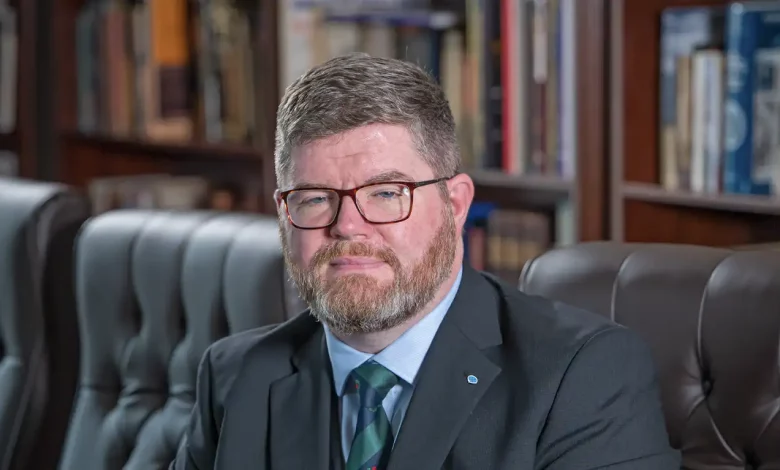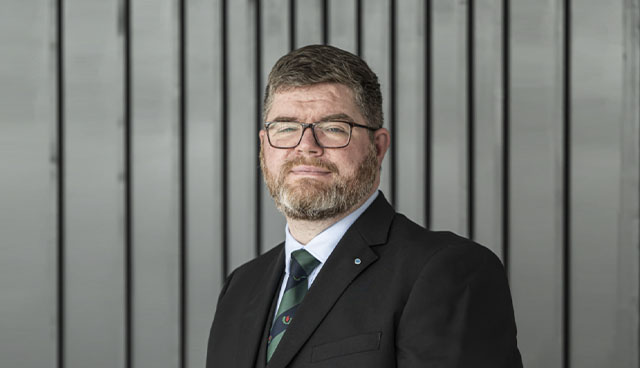A new approach for Ulster-Scots

Ulster-Scots Agency CEO Ian Crozier discusses the opportunity through the New Decade, New Approach agreement to appreciate the true scale and value of Ulster-Scots identity.
First and foremost, explains Crozier, the term Ulster-Scots refers to a community of people, the Ulster-Scots. From the early 1600s onwards, Scottish people flooded into Ulster, first as part of community organised settlements in Antrim and Down and then the government-backed Plantation of Ulster: and then as refugees fleeing famine and religious persecution. Within a relatively short time, about 30 years, they were being referred to not as Scots, but as Ulster-Scots and have been known by that name ever since.
The term Ulster-Scots is also used to refer to the culture and heritage of the Ulster-Scots community, in other words its cultural identity. The Ulster-Scots community has its own language, also brought from Scotland, which for centuries was simply known as ‘braid Scotch’ or ‘broad Scots’, but for the last one hundred years or so it has also been referred to as Ulster-Scots.
Crozier is incredibly passionate about all aspects of Ulster-Scots but expresses some frustration that the imposition of a narrow linguistic focus has at times tended to stifle the development of a broader understanding of the Ulster-Scots community and their identity.
“In 1998, Ulster-Scots was given recognition in the Good Friday Agreement with the creation of the North/South Language Body. While this was a welcome step, I think being framed within a language setting has tended to reinforce a linguistic focus in the minds of policy makers and many in the media and body politic that has been detrimental to the broader cultural identity,” he says.
“The Ulster-Scots community, our beliefs and traditions have shaped the place that we live in today. Many aspects of Ulster-Scots identity, whether in terms of music, sport, our speech, or our characteristic ‘thran’ nature, have become mainstream in Northern Ireland, not narrow cultural markers, but broad themes in our society. Adopting an artificially narrow focus on Ulster-Scots misses out on a treasure trove of cultural wealth and risks making everyone here, whether they identify as Ulster-Scots or not, culturally poorer.”
The Presbyterian ethos of the Ulster-Scots was fundamental, according to Crozier, as with it came a focus on education and a love of liberty which had been central to the Scottish Reformation and laid the foundations for the age of enlightenment. Ideas with their roots in Scotland took hold in Ulster and were later carried around the world with the Ulster-Scots diaspora.
“The idea that an unjust king or government could be defied, which started with the Covenanters, was taken to the next level at the Siege of Derry. A generation or two later, when civil and religious liberty was again denied, the Ulster-Scots in America, or Scotch-Irish as they became known, inspired by stories of the Covenanters and Londonderry, overthrew the king and secured American independence,” he explains.
The value placed by Ulster-Scots on learning led to a vibrant education scene and the foundation of many of Northern Ireland’s best-known schools, like Belfast Royal Academy, RBAI, Campbell College and Victoria College, as well as Queen’s College, later QUB.
People from the Ulster-Scots community and its diaspora have been to the fore in almost every field of human endeavour, whether science, engineering, medicine, diplomacy, politics, the military, sport, arts, music and many more besides. That is one reason why Crozier thinks it is ironic that among a range of slurs often thrown at Ulster-Scots is that it is the preserve of stupid people. He points out that the Ulster-Scots language, so often a lightning rod for detractors, was the medium for generations of literary genius, up to and including 20th century giants like CS Lewis and Seamus Heaney.
“Everyone needs to understand that identity in Northern Ireland is multi-layered and the picture is usually more complicated than it appears.”
“Linguistically, Ulster-Scots as it is now known, is a daughter of the Scots language, which has a pedigree stretching back over one thousand years [the earliest known Ulster-Scots poem is 300 years old this year]. Scots is a sister language of English and we are all members of the Germanic language family, which includes German, Dutch, Flemish, Swedish, Norwegian and Danish. We are often compared linguistically with Irish, but that is like comparing apples and oranges,” he explains.
“One thing that both languages share, however, is that they live in the shadow of English, a global language. Speakers of both Irish and Ulster-Scots have faced strong pressures, sometimes internal from their own families and sometimes external from the education system and the media, to moderate their speech in the name of getting on.”
Despite these pressures, at the time of the 2011 census, 140,000 people in Northern Ireland indicated some ability in Ulster-Scots. Crozier believes that this figure is just the tip of the iceberg.
“Folk with ability in Ulster-Scots often aren’t aware of it, thinking they only speak English because that is what they were taught in school. They don’t realise that they learned a different language at home, their true mother tongue and really, they have been bilingual all along.”
The mission of the Ulster-Scots Agency is to inspire and empower people and communities in Ulster to embrace their Ulster-Scots identity, build kinship with those outside Ulster who share that identity and friendship inside Ulster with those who do not.

“Ulster-Scots occupies a much more central place in our society than many people realise, the challenge for us now is to help everyone understand that and embrace it.”
During the pandemic, the Agency provided Covid recovery funding to well over 600 organisations including bands, halls and community groups across Northern Ireland and the border counties of Ireland that are involved with Ulster-Scots, demonstrating a much larger community sector than many would have previously anticipated.
A new language initiative, Wheen o Wurds, launched just prior to Covid-19, has also seen a very high response. The online quiz, which helps people to appreciate the Ulster-Scots words they use every day and leads to the award of a Wheen o Wurds badge, has so far been successfully taken by more than 150,000 people.
Crozier believes these unprecedented results show clear evidence of the importance of Ulster-Scots, not just to the Ulster-Scots community, but to everyone in Northern Ireland. “Whether in terms of language, heritage or culture, Ulster-Scots occupies a much more central place in our society than many people realise, the challenge for us now is to help everyone understand that and embrace it for the good of us all.”
The CEO observes that Ulster-Scots identity has weathered a real storm in the last 50 years. “The Troubles forced people into a binary world, where British and Irish national identities were the focus and Ulster-Scots was squeezed into the background. After 1998, Ulster-Scots returned to the fore, but faced an onslaught from those still trapped in a two tribes mentality. Whether attacking our language or identity more generally, Ulster-Scots have too often been spoken of and treated in a way that would not be tolerated in respect of any other group in our society. Generations of Ulster-Scots have grown up not knowing about their identity or embarrassed to embrace it, listening to people who said we had no culture.
“Outdated attitudes that deny or diminish Ulster-Scots must be challenged and overcome. Everyone needs to understand that identity in Northern Ireland is multi-layered and the picture is usually more complicated than it appears. The best thing we can do is be curious and find out for ourselves.”
“Ulster-Scots has shaped our society and through our diaspora can shape our place in the world.”
The CEO is optimistic that a broader understanding and package of supports for Ulster-Scots in the New Decade, New Approach agreement of January 2020 can serve as a springboard for ambitions to enable Ulster-Scots to go from surviving to thriving. The agreement acknowledged the need for greater support for Ulster-Scots in schools, placing a duty on the Department of Education to encourage and facilitate the use of Ulster-Scots in the education system; provided for a commissioner to enhance and develop the language, arts, and literature associated with the Ulster-Scots tradition in Northern Ireland; and paved the way for a long-term strategy for Ulster-Scots language, heritage, and culture.
Crozier was part of an expert advisory panel which has recently delivered a recommendations report for the strategy, with a call for views closed at the end of April 2022. “We have expressed some qualms about some of the terminology that has been used, as we feared that it could have drifted towards some of the narrow interpretations of the past, but the terms of reference for the strategy and crucially the decision of the UK Government to recognise the Ulster-Scots community as a national minority within the UK under the Framework Convention for National Minorities place the new protections firmly within a context that should see support for Ulster-Scots identity in its broadest sense.”
Quizzed on what he would identify as progress in the coming years, Crozier says: “We need to see Ulster-Scots in all its forms appreciated across government for the value that it can bring to everyone in Northern Ireland and supported accordingly.
“Ulster-Scots has shaped our society and through our diaspora can shape our place in the world. 2026 will see the 250th anniversary of the American Declaration of Independence, which was brought about by the Ulster-Scots. What other country wouldn’t love to have that link? At a time when there is great concern about the balance of relationships within our islands, Ulster-Scots can be a social and cultural bridge.
“As we continue to come out of the pandemic, Ulster-Scots can help bring communities together again. Whether we want to promote diversity, improve creativity, inspire our young people, improve our neighbourhoods, attract tourism or inward investment, Ulster-Scots has a great contribution to make in the future, just as it has in the past.”






